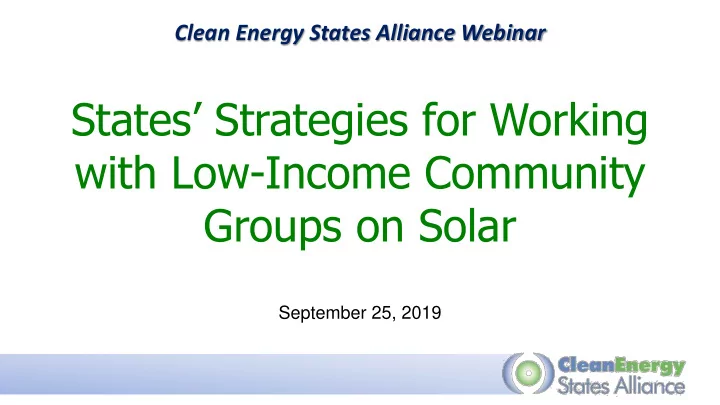

Clean Energy States Alliance Webinar States’ Strategies for Working with Low-Income Community Groups on Solar September 25, 2019
Housekeeping Join audio: • Choose Mic & Speakers to use VoIP • Choose Telephone and dial using the information provided Use the orange arrow to open and close your control panel Submit questions and comments via the Questions panel This webinar is being recorded. We will email you a webinar recording within 48 hours. CESA’s webinars are archived at www.cesa.org/webinars
www.cesa.org
State Energy Strategies • Funded by the U.S. Department of Energy through the Solar Energy Technologies Office. • The Clean Energy States Alliance is working with CT, DC, MN, NM, OR and RI to make solar more accessible to low- and moderate-income residents. • Research support provided by Lawrence Berkeley National Laboratory and the National Renewable Energy Laboratory.
States’ Strategies for Working with Low -Income Community Groups on Solar Webinar Speakers Shauna Beland Nicole Hernandez- Betsy Kauffman Chief – Program Hammer Renewable Energy Development, Rhode Sector Lead, Energy Project Director, Clean Island Office of Energy Trust of Oregon Energy States Alliance Resources (moderator)
Thank you for attending our webinar Nicole Hernandez Hammer Project Director, CESA nicole@cleanegroup.org Find us online: www.cesa.org facebook.com/cleanenergystates @CESA_News on Twitter
Upcoming Webinars FERC 841 Compliance Update Tuesday, October 1, 3-4pm ET Messaging Research on Public Perceptions of the US Electric Grid (CESA Members Only) Tuesday, October 8, 1-2pm ET Replacing Power Plants with Low-Income Residential Solar+Storage Thursday, October 10, 1-2pm ET Read more and register at www.cesa.org/webinars
R.I. OFFICE OF ENERGY RESOURCES Community Solar: Making renewable energy accessible to all Rhode Islanders
Image Credit: Energy Sage
1 st Community Solar Project in Rhode Island
Meetings with Solar Developers and Subscriber Management Companies
Coming Soon – RI Community Solar Marketplace www.RIsolarmarketplace.com
LMI Solar Outreach in Oregon September 25, 2019
Our process over the past three years Work Group Draft Gatherings 1.0 strategies Meetings Innovation Finalized around the grants strategies state Work group Workshopping Results! 2.0 2
Spectrum of Public Participation Empower Collaborate Involve Consult Inform International Association of Public Participation 3
2017 gatherings • Events in four communities across Oregon • Presentations and listening sessions • 140+ attendees • Small group discussions, meal • What we got: • Local values • Early LMI principles • Distribution list! • Interested people 4
LMI Solar Work Group 1.0 • Enlisted a core stakeholder workgroup • Charged with investigating barriers, opportunities and solutions • Participatory planning activities • At first, typical set of energy stakeholders 5
LMI Solar Work Group 1.0 Energy organizations Utilities • Bonneville Environmental • Pacific Power Foundation • Portland General Electric • Citizen’s Utility Board Pre-apprenticeship Training • Community Energy Project Programs • Douglas County Smart Energy • Constructing Hope • Northwest Energy Coalition Housing/LMI agencies and • Oregon Solar Energy Industries organizations Association • Community Action Partnership • Spark Northwest of Oregon • Sustainable Northwest Communities of Color • 350 Deschutes • Native American Youth & Family Government agencies • Verde • Multnomah County – Office of Community Development Sustainability Corporations • Oregon Department of Energy • REACH CDC 6
30+ meetings in nine communities 7
Road trip meetings • Energy organizations • Communities of color • Tribal governments • County and local agencies • Solar installers • CAP agencies • Housing authorities Result: We revised and finalized our strategies 8
LMI Solar Work Group 2.0 • (10) $3,000 scholarships to support participation • Focused on underrepresented groups • Six half-day meetings “It’s essential to value the time and expertise of LMI-serving agencies – no different from any other consultant – as often renewables falls outside of the core mission for most of these organizations.” – Work Group 2017-2018 member 9
Work Group 2.0 Communities of Color Community Action Agencies • Lower Columbia Hispanic • Community Action Partnership Council of Oregon • African American Alliance for • NeighborImpact Homeownership Community Development • NAACP Corporations • Verde • CH CDC • Centro Cultural • Umpqua Community • Native American Youth & Development Family LMI Non-profits Affordable Housing Providers/ • Habitat for Humanity Authorities Pre-apprenticeship Training • Portland Community Programs Reinvestment Initiative • Constructing Hope 10
Meeting Topics • LMI Housing Types • Solar 101 and finance • “Co - benefits” o Housing affordability, stability o Community resilience and energy planning o Workforce • Real-world solutions - charette “There’s not a solar crisis, there’s a housing crisis” Carolina Iraheta-Gonzales - Community Energy Advocate, Verde
We put the “work” in work group…
Innovation Grants • Seeding innovative models championed by local partners • $81,600 in small grant funding awarded to nine selected community groups • Blend of delivery models (rooftop, multifamily, community solar) • Continued support for replicable models
Innovation grant example 1 Putting solar on the roof of a community building at a manufactured home park owned by the nonprofit NeighborWorks Umpqua. Benefits shared with tenants with high energy burdens. 14
Innovation grant example 2 Adding solar education to existing 8-hour, HUD- approved Homebuyer Education Classes. Exploring use of Individual Development Accounts as a way for current homeowners to save money for post- purchase solar installation. 15
Innovation grant example 3 Putting solar on 20 Habitat for Humanity homes. The Cooperative monetizes the federal tax credit. Zero- interest loans provided by people in the community. 16
Lessons learned 1) Deep and meaningful engagement • Hit the road! • Personalized recruitment 2) Empower Participation • Scholarships • Keep it relevant • Participatory planning 17
Lessons learned 3) Listen! And revise your plans • Your ideas may need to be changed or dropped 4) Support local innovation • Planning grants • Continued support, ongoing relationship building 18
Thank you! Betsy Kauffman Sector Lead – Renewable Energy betsy.kauffman@energytrust.org 503.459.4072
Recommend
More recommend